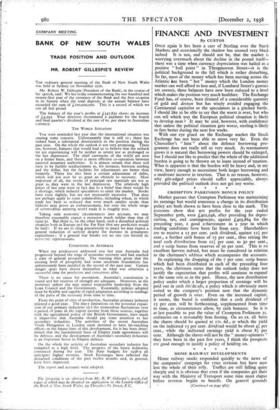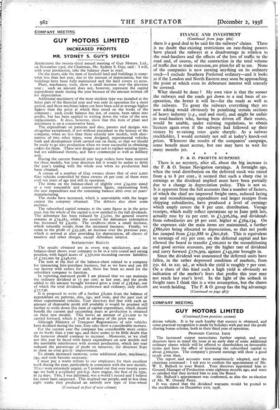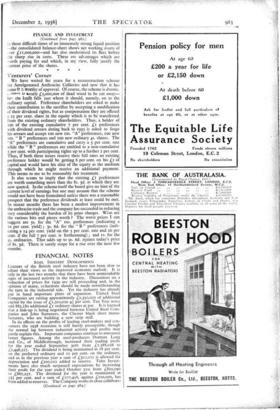FINANCE AND INVESTMENT
By CUSTOS
ONCE again it has been a case of Sterling over the Stock Markets and occasionally the shadow has seemed very black indeed It is not, and should not be, that the market is worrying overmuch about the decline in the pound itself— there was a time when Currency depreciation was hailed as a positive " bull point " in Throgmorton Street—it is the political background to the fall which is rather disturbing, So far, most of the money which has been moving across the Atlantic ilas been " hot " money which the London money market can well afford to lose and, if Lombard Street's guesses are correct, these balances have now been reduced to a level which makes the position very much healthier. The Exchange Fund has, of course, been drained of a considerable quantity of gold and devisen but has wisely avoided engaging the Continental capitalist or the speculators in a pitched battle. I should like to be able to say that the worst is over, but who can tell which way the European political situation is likely to develop next ? It may be said, however, with confidence that unless the political situation gets worse, sterling is likely to fare better during the next few weeks.
With one eye glued on the Exchange market the Stock Exchange has not been able to move very far. Even the Chancellor's " hint " about the defence borrowing pro- gramme does not really tell us very much. As rearmament grows it is natural that borrowing powers should be enlarged, but I should not like to predict that the whole of the additional burden is going to be thrown on to loans instead of taxation. What is apparent is that the burden will be heavy and, in my view, heavy enough to necessitate both larger borrowing and a moderate increase in taxation. That is no reason, however, why gilt-edged prices should suffer appreciably, always provided the political outlook does not get any worse. * * * *
CROMPTON PARKINSON BONUS POLICY
Market guesses that Crompton Parkinson was maintaining its earnings but would announce a change in its distribution policy are both shown to have been close to the mark. The accounts show that net profits for the . year ended September 3oth, were £402,046, after providing for depre- ciation, tax, and contingencies, against £403,864 for the preceding year, a good achievement in a year in which trading conditions have been far from easy. Shareholders are to receive a 1.5 per cent. cash dividend, against 124- per cent., a further cash bonus of 15 per cent., thus raising the total cash distribution from 124 per cent. to 3o per cent., and a scrip bonus from reserves of 5o per cent. This is an excellent harvest indeed, but must be considered in relation to the chairman's address which accompanies the accounts.
In explaining the dropping of the 7 per cent. scrip bonus which had been distributed in each of the preceding four years, 'the chairman states that the outlook today does not justify the expectation that profits will continue to expand at the same rate as in the past. Hence, the new distribution policy under which a larger proportion of earnings will be paid out in cash divide ads, a policy which is obviously more suited to the company's position now that the dynamic period of growth is over. Even on the increased capital, it seems, the board is confident that a cash dividend of 15 per cent. will be forthcoming, supplemented from time to time, as circumstances allow, by cash bonuses. So it is at last possible to put the value of Crompton Parkinson 5s. ordinaries on a reasonably firm footing. On an ex. all basis the shares should be quoted at 17s. 6d., at which the yield on the indicated 15 per cent. dividend would be about 44 per cent., while the- indicated earnings yield is about 81 per cent. Although the shares will not be the " money-spinners ' they have been in the past few years, I think the prospects are good enough to justify a policy of holding on.
* * * • *
HOME RAILWAY DEVELOPMENTS
Home railway stocks responded quickly to the news of the companies' campaign for rates revision but have now lost the whole of their rally. Traffics are still falling quite sharply and it is obvious that even if the companies get their way with the Ministry of Transport some time must elapse before revenue begins to benefit. On general grounds (Continued on page 982)_ FINANCE -AND INVESTMENT
- (Continued froin pate 980)
there is a good deal to be said for the railways' claims. There is no doubt that existing restrictions on rate-fixing powers 'have placed the railways at a disadvantage in' relaticn to - the road-hauliers. and the effects of the loss of traffic to the road and, of course, of the contraction in the total voluthe * * * * P. & 0. PROFITS SURPRISE . There, is no mystery, after all, about the big increase in the P. & 0. Steam Navigation earnings. A fortnight-ago, when the total distribution on the deferred stock was raised from 4 to 8 per cent., it seemed that such a sharp rise in earnings as the dividend implied must have been partially due to a change in depreciation policy. This is not so. It is apparent from the full accounts that a-number of factors, of which the chief are improved freight rates, reduced laying_ up and reconditioning expenditure and larger receipts from shipping subsidiaries, have produced a level of earnings which amply covers the 8 per cent. distribution.' Voyage receipts, which really reflect operations up to June 3oth last, actually rose by 19 per cent. to £I,326,264, and dividends from subsidiaries are 36 per cent. higher at £564,134. On the expenses side the main items are maintained, a further £88o,00o being allocated to depreciation, so that net profit has jumped from £231,888 to £6o1,656. This is equivalent to earnings of ioj per cent. on the deferred capital and has allowed the board to transfer Lipopoo to the reconditioning and good service accounts, pay the higher rate of dividend and carry forward £17°,309, against £143,200 brought in. Since the dividend was announced the deferred units have fallen, in the rather depressed condition of markets, from 25s. 6d. to 22S. 9d., at which the yield is roughly 7 per cent. On a share of this kind such a high yield is obviously an indication of the market's fears that profits this year may not reach last year's level. In the light of the setback in freight rates I think this is ,a wise assumption, but the shares are worth holding. The P. & 0. group has the big advantage (Continued on page 983) FINANCE AND INVESTMENT (Continued from page 982.) in these difficult times of an immensely strong liquid position —the consolidated balance-sheet shows net working assets of over it r,000,000—and has also modernised its fleet before the sharp rise in costs. These are advantages which are worth paying for and which, in my view, fully justify the current price of the shares. * * * * Venturers' Corner We have waited for years for a reconstruction scheme for Amalgamated Anthracite Collieries and now that it has come ir if worthy of approval. Of course, the scheme is drastic. -,,Ive•••: u nearly £5,000,000 of dead wood to be cut away- bvE the knife falls just where it should, namely, on to the ordinary capital. Preference shareholders are asked to make their contribution to the sacrifice by accepting a modification of their dividend rights, but as compensation they are offered a 25 per cent. share in the equity which is to be transferred from the existing ordinary shareholders. Thus, a holder of too of the existing cumulative 7 per cent. LI preferences with dividend arrears dating back to 1935 is asked to forgo his arrears and accept too new los. "A" preferences, too new ros. " B " preferences and ma new ordinary 4s. shares. The "A" preferences are cumulative and carry a 5 per cent. rate while the " B " preferences are entitled to a non-cumulative 5 per cent. with participating rights up to a further 2 per cent. Thus, if both these issues receive their full rates an existing preference holder would be getting 6 per cent. on his £r of capital and would have his slice of the equity as the medium through which he might receive an additional payment. This seems to me to be reasonably fair treatment. It also stems to imply that the existing £r preferences are worth something more than the 8s. 3d. at which they are now quoted. In the scheme itself the board give no hint of the current level of earnings but one may assume that the scheme would not have been formulated unless there was a reasonable prospect that the preference dividends at least could be met. In recent months there has been a modest improvement in the anthracite trade and the company has succeeded in reducing very considerably the burden of its prior charges. What are the various bits and pieces worth ? The worst prices I can suggest are 5s. for the "A" los. preferences (indicating a to per cent. yield) ; 3s. 6d. for the " B " preferences (indi- cating a 14 per cent. yield on the 5 per cent. rate and 20 per cent. if the full 7 per cent. is forthcoming) ; and Is. for the " 4s. ordinaries. That adds up to 9s. 6d. against today's price of 8s. 3d. There is surely scope for a rise over the next few months.




























































 Previous page
Previous page